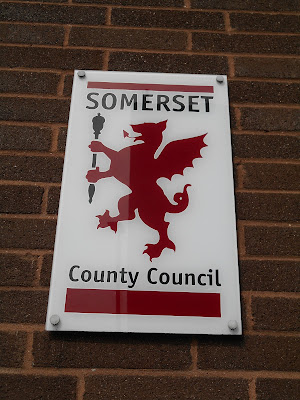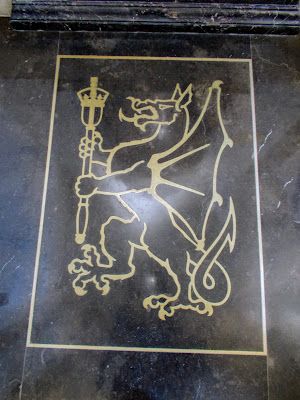Dragons were usually aggressive solitary creatures, which lived in caves, marshes or lakes or on hilltops. They ate livestock and people.
Saints who were also dragon slayers include St Michael, St George, St Carantoc, St Margaret, St Petroc and St Dubricius. The parish church in Porlock is dedicated to St Dubricius. In Somerset dragons were also slain by a bishop, a knight, a landowner, a woodman and local villagers.
Somerset has more dragon legends that most British counties. The stories were handed down through the generations and some have undoubtedly been lost.
Most of the legends involve people killing dragons:
- Norton Fitzwarren: a dragon lived on the Iron Age hillfort and was killed by a local man called Fulk Fitzwarin
- Carhampton: a Celtic saint named St Carantoc defeated a dragon which lived on the marshes.
- Bicknoller: there is a legend that a dying dragon will try and reach the sea, which is why there is a Dragon's Cross at Bilbrook.
- Shervage Wood: the Gurt Wurm or Great Worm was cut in half by a woodman from Stogumber. One part ran to Bilbrook and the other to Kingston St Mary.
- Kingston St Mary: a dragon lived nearby and breathed out flames, which it used to cook its animal and human victims. A villager rolled a large stone down a hill into its mouth and killed it.
- Churchstanton: a dragon was slain by a valiant knight.
- Castle Neroche: a dragon stole treasure from passing travellers but it was eventually drowned by local villagers.
- Aller: there are several versions of the story. One is that John Aller killed a dragon with a spear.
- Worminster Sleight: a dragon with the face of a woman was terrorising the people of Dinder, Dulcote and North Wootton. It was slain with a sacred sword from Glastonbury by Bishop Jocelyn of Wells.
- Kilve: a dragon called Blue Ben went into the sea to cool off but got stuck in the mud and drowned when the tide came in.
- To ward off evil spirits
- To illustrate local legends
- To illustrate the lives of the saints who were involved with dragons
- Purely decorative
- To represent the victory of Christianity over Paganism.
- Dragon: this has four legs, wings and a long tail
- Wyvern: this has legs and wings but no arms
- Cockatrice or basilisk: - this has the head and legs of a cockerel with the tail of a dragon. Cockatrices were small, dangerous and lived in underground holes.
- Great Worm or Flying Serpent
- Amphisbaena: this has two heads
- Ouroboros: this is a dragon biting its own tail
- Multi-Headed Dragon
- Arachnidraco: this has the head of a dragon on an elongated neck, a body with 2 legs and a venomous stinging barb at the tip of its tail.
- Sea dragon/serpent
- Facie Humanusdraco: this has the face of a human (usually a woman) but the body of a dragon.
Wyvern Mosaic, Magdalen Lane, Taunton
Somerset County Cricket Ground, Taunton
Flying dragon on a house in Mill Street, Watchet
Dragon on one of Wiveliscombe's "Totem Poles"
Taunton Library's dragon
Dragon slaying at East Stoke Church
This is one of the earliest representations of a dragon slaying in Britain. It is possibly Saxon but the identity of the dragon slayer is not clear. It is thought that it is not St Michael, as he is always depicted with wings and it is too early to be St George.
Nettlebridge - dragon door hinges
Kingston St Mary Seat
Queen's College, Taunton
King's Arms, Staplegrove Road, Taunton
Dragon at Runnington
Runnington's only dragon?
Dragon on a shield at North Cadbury Church
Two headed dragon at Crowcombe Church
Dragon slaying at Hatch Beauchamp Church
Hatch Beauchamp - this dragon appears to be defecating!
Dragon Slaying, Hatch Beauchamp
Amphisbaena or two headed dragon on a bench end in East Brent Church
Many thanks to Hazel and Jacob for finding the bench and taking this photo for me.
Dragons guarding County Hall in Taunton
Traditional Somerset County Council Dragon
Modern Somerset County Council Dragon, Taunton Library
Green Dragon Pub, South Street, Wellington
Dragons on the entrance doors to St Barnabas Church, Queen Camel
Sea serpents on the font at St Barnabas Church, Queen Camel
Cockatrice
Bench end, St Michael's Church, North Cadbury
This may be dragons hatching from eggs or possibly just two snails!
Bench end, St Michael's Church, North Cadbury
St Margaret escaping from a dragon
Bench end, St Michael's Church, North Cadbury
Dragon Slaying on a Misericord, Wells Cathedral
St George killing a dragon
Bench end in St George's Church, Dunster
St Michael killing a dragon:
Bench end in St George's Church, Dunster
St George and a dragon, pulpit at St George's Church, Dunster
Two amphisbaena dragons
Church of St Peter and St Paul, Churchstanton
This used to be a bench end but is now mounted on the front of the gallery
Dragon on a bench end at All Saints' Church, Alford
Wyvern on a stained glass window at All Saints' Church, Alford
Dragon weathervane on Kingston St Mary Village Hall
St George slaying a dragon in the middle of the war memorial in Crowcombe Parish Church
Dragon on the Norton Fitzwarren Village Sign
Close up of the Norton Fitzwarren Dragon
Green Dragon Pub at Combe St Nicholas
Green Dragon sculpture outside the Green Dragon Pub at Combe St Nicholas
St George and the Dragon on the noticeboard of St George's Church, Dunster
Dragon living in the Carpet Warehouse, Priory Bridge Road, Taunton
Golden dragon at Bridgwater and Taunton College
Wyvern - emblem of Queen's College, Taunton
Dragon mosaic on the side of Aller Village Hall
Somerset County Council's dragon on the Silk Mills Bridge in Taunton, which was opened in 2005 and built to replace a level crossing
The name of the Green Dragon pub in The Square, Wiveliscombe was changed to the White Hart in 1807
Plaque on the former George Inn, West Street, Wiveliscombe
Dragon on the stairs of the Bishop's Palace, Wells
Sleeping dragon in the gardens of the Bishop's Palace, Wells
Willow dragon by the River Exe at Exford
Dragon on the wrought iron gate at one of the entrances to the Orchard Shopping Centre, Taunton
Topiary dragon in the gardens of Dunster Castle
St George and the Dragon - stained glass window in St Decuman's Church, Watchet
Somerset County Council Dragon, County Hall, Taunton
Taunton's newest dragon, High Street, Taunton
This wooden dragon was unveiled on 11th February 2023 by the Mayor of Taunton, Councillor Sue Lees and the Chair of Somerset West and Taunton Council, Councillor Hazel Prior-Sankey. It was created by local chainsaw artist Matthew Crabb from durable cedar and is 4 metres high. It is located where two trees used to grow. They had to be felled when they outgrew their brick planters. It was commissioned by Somerset West and Taunton Council and is intended to be a legacy for them before the creation of the new unitary Somerset Council on 1st April 2023.
Taunton Dragon
Taunton Dragon
"Proud Heritage" Dragon from the 2014 Taunton Dragon Trail
He is currently residing in Norton Fitzwarren Village Hall, on loan from Dave Durdan, who was Mayor of Taunton Deane in 2014.
Dragon on the pulpit in St Mary Magdalene's Church, Exford
Somerset County Council Dragon on the Somerset Heritage Centre at Norton Fitzwarren
The names of all the parishes in Somerset are written on him in very small print.
Wooden carving of the Gurt Wurm, Shevage Wood
Pairs of carved wooden dragons on the beams of the nave roof of St Michael's Church in Somerton
Sundial with a dragon in the centre, Lady Smith Institute, Somerton
Dragon Window, All Saints Church, Trull
Three saints fighting three dragons are shown in this window. On the left is the Archangel Michael, in the centre is St Margaret of Antioch and on the right is St George.
A pair of carved wooden dragons guarding the path near Castle Neroche
Dragon of Worminster Sleight mosaic, Wells
This mosaic was created in 2001 as part of the Three Villages Dragon Festival, to commemorate the slaying of the Worminster Dragon by Bishop Jocelyn during the 13th century. It is located at the side of the footpath on the south side of the Bishop's Palace.
Beware! The Dragon of Worminster Sleight, who returns to Dinder, Dulcote and North Wootton every 50 years.








































































Love your website, so much research and information. Thank you. I live in Dorset, grew up in Dunster (Minehead school), think you'll find the second photo of bench end in St George's church, Dunster, is St Michael. I posted on FB about dragons on St Carantoc's day, 16 May.
ReplyDelete